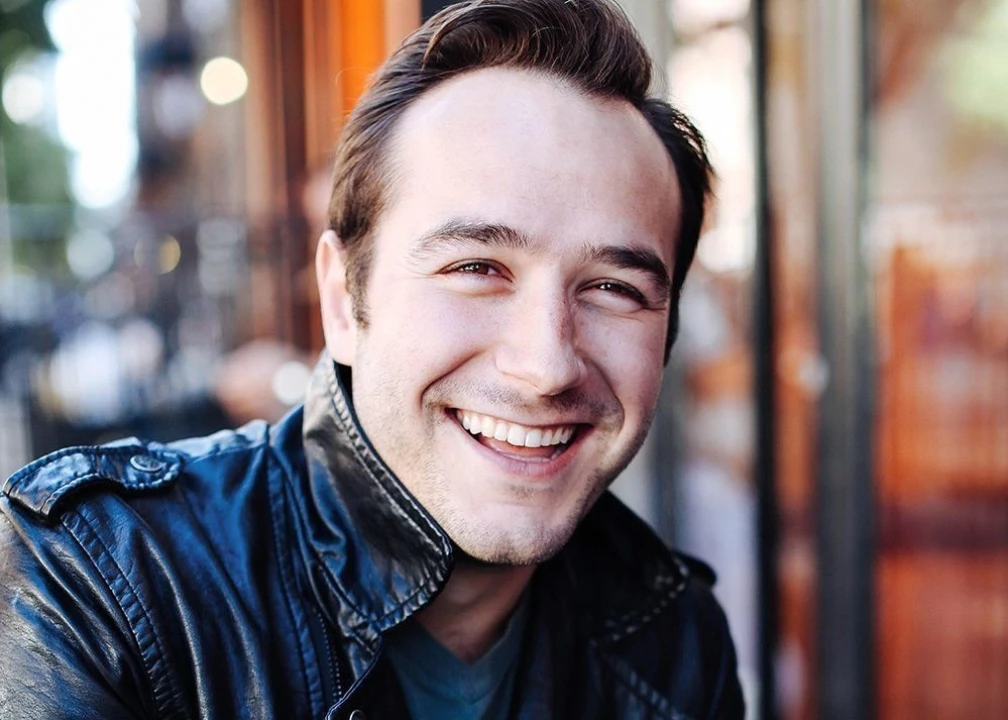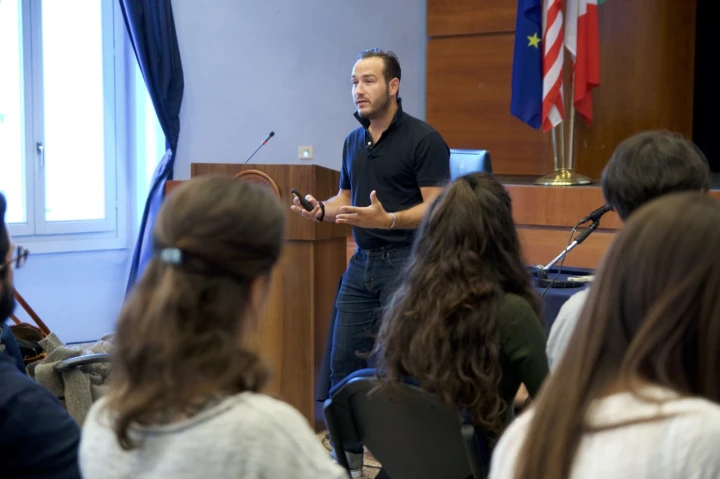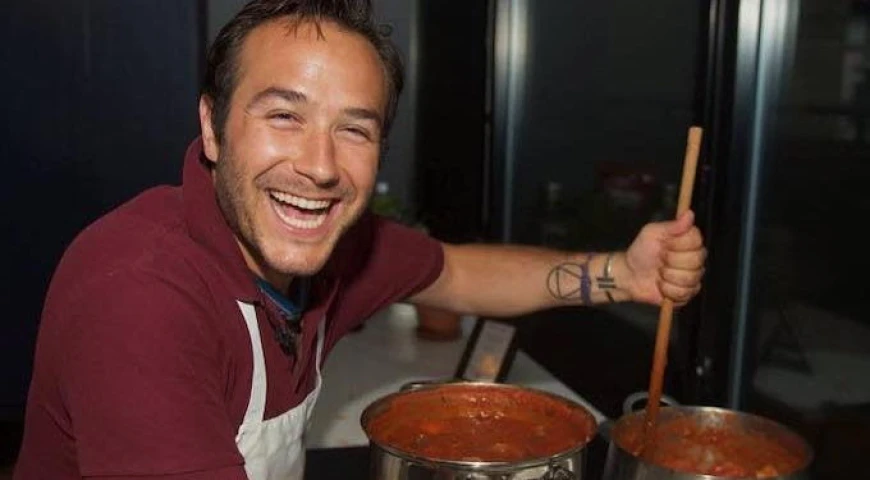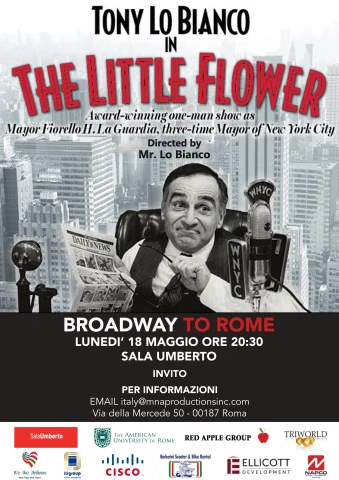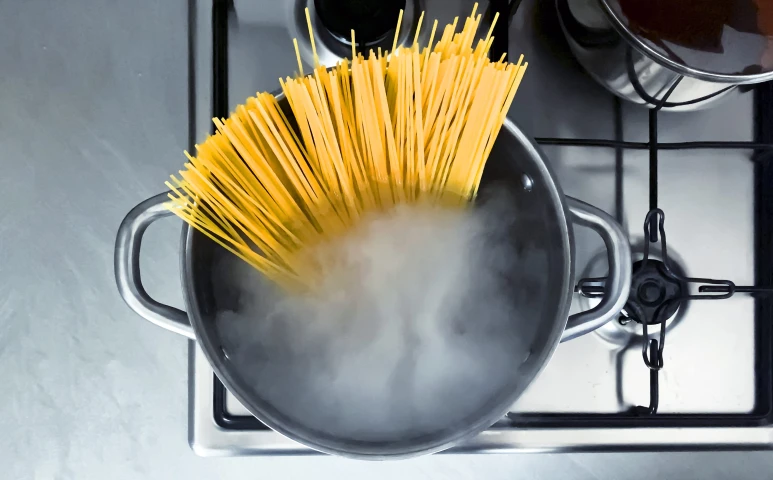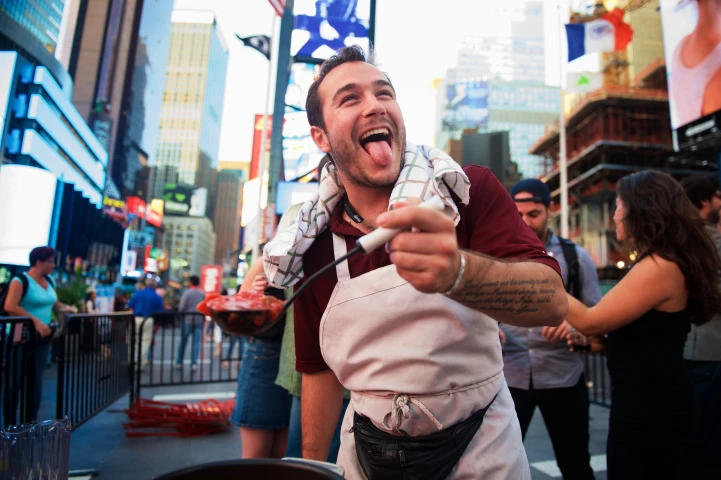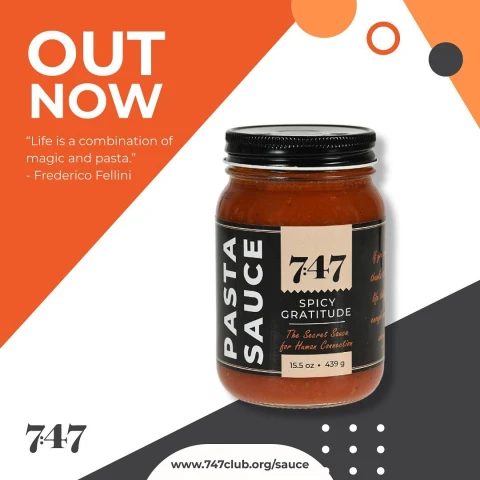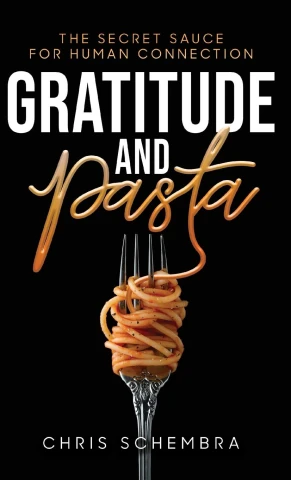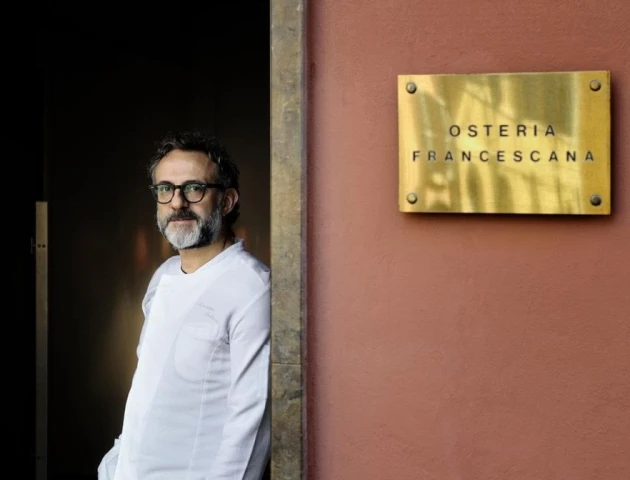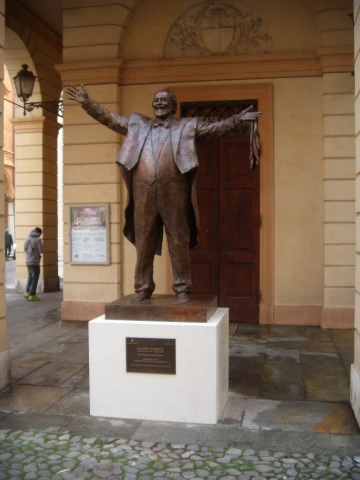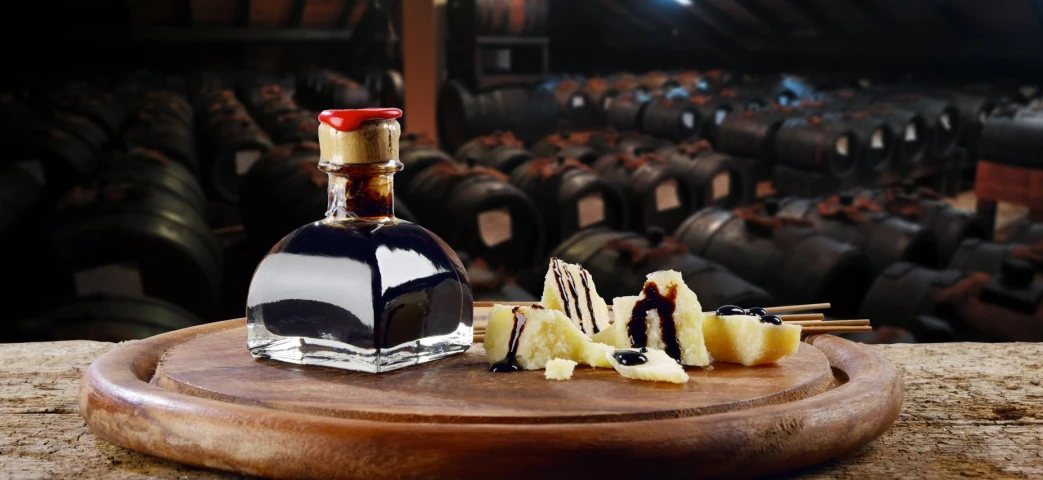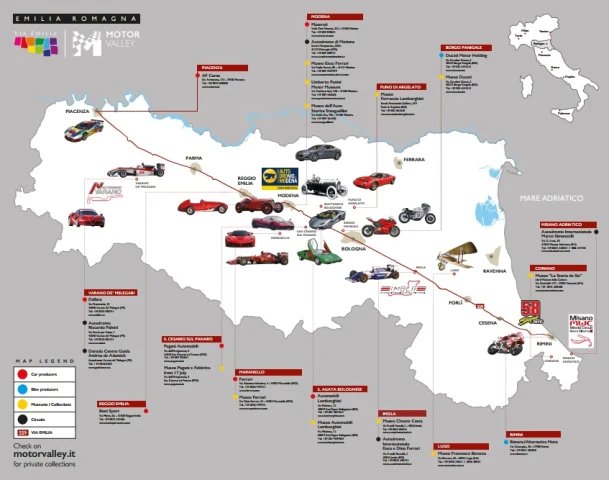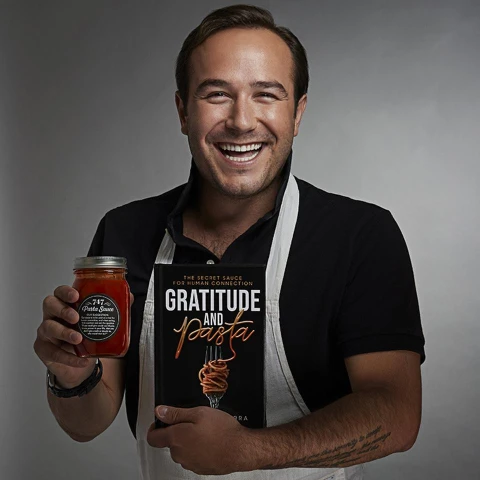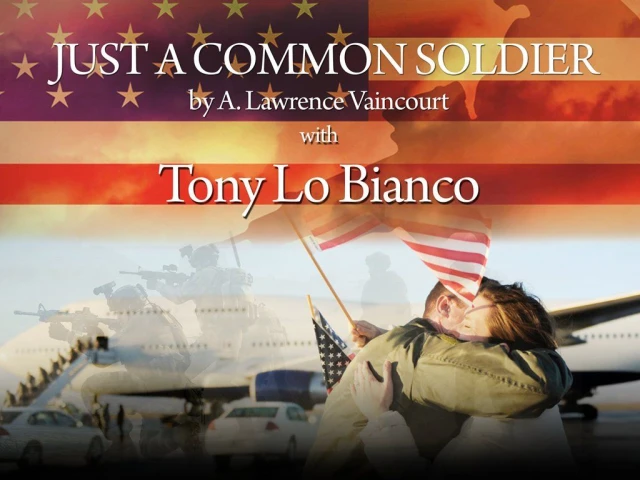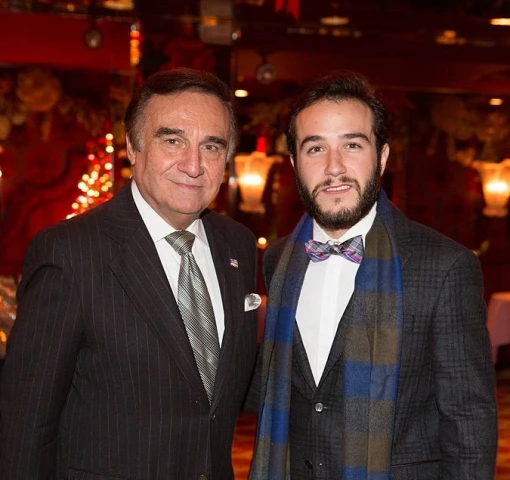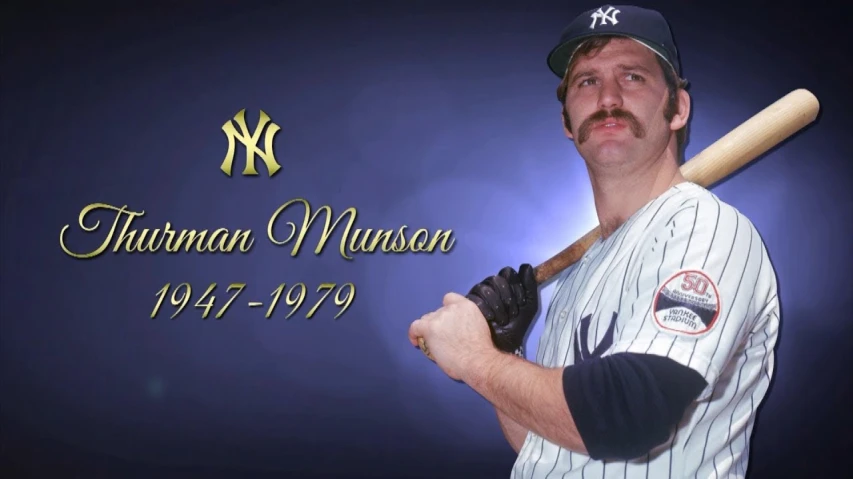In 2015 I made a small contribution to a crazy, unprecedented and wonderful feat. A group of visionaries managed to bring the great actor Tony Lo Bianco to Rome, where in a historic evening at the Sala Umberto he staged his show "The Little Flower," the story of Fiorello La Guardia, the most beloved mayor by his citizens in the history of New York. Obviously Italian-American, both he and Tony. The driving force behind this wonderful endeavor was Chris Schembra, also Italian American, young, bright, enthusiastic.
In 2017 I took Chris to John Cabot University here in Rome: in the meantime he had opened his own business and gave a fantastic lecture to the students of the JCU Institute for Entrepreneurship. He's the protagonist of today's interview, one of those for which I'm sorry there's no video: during his answers Chris was gesticulating as only an Italian can do, and it was a joy for the eyes to see him at least as much as for the ears to listen to what he was telling me. February is the month of love, since in these days Valentine's Day falls: and the gratitude that moves Chris' activity is undoubtedly a beautiful form of love.
Chris, welcome to We the Italians. First of all, please tell our readers something about you and your Italian roots
My Italian roots are these: on my father's side of the family, my grandfather came off the boat on Wednesday August 2nd 1916 from Sicily, and on my mother's side my grandfather came off the boat from Stio, a small town in the province of Salerno, Campania. Just like any Italian American family, my grandparents did not really speak English, and so my dad grew up listening to Italian but he could never speak it, therefore I never learned it.
You are the founder of the 7:47 Club. Please tell us what it is, how you came up with this idea and how it works
The story goes back to July 2015. I had just returned from Rome, after producing a play over there at Teatro Sala Umberto on May 18. I was working with the great Tony LoBianco and thanks to Alessandro Longobardi and Gianni Bozzacchi we were able to bring his famous play, “The Little Flower”, to Italy. Umberto, you know it because you were there and helped us.
Rome made me come alive. It was having conversations with you and driving around with Gianni Bozzacchi and taking walks in the Trastevere and the other great places that Rome had to offer. When I got back to New York, I realized that it didn’t feel right. Back in New York I was lonely, unfulfilled in my job and disconnected from myself.
The last time I had felt those things all at once was in my early 20s. Unfortunately, it led me down a deep dark path of depression, jail, addiction, rehab, and I didn't want to go back. So I thought “What was it about Rome? Was it the art? The heritage? The nostalgia? The culture? The cuisine?” Well it was pasta, and specifically la carbonara! Back home in my kitchen in New York I started playing around with different recipes and I accidentally created a tomato based sauce, that I thought was pretty good. But I figured I should feed it to people to see if it was good or not, and the ritual began. Night after night, week after week, month after month, people started gathering in our home.
They would come over with a bottle of wine, we would work together to create the meal, we would have some really good pasta sauce and they'd leave feeling fulfilled and connected. These dinners kept going on, to spark over 500.000 relationships around the dinner table and I realized that the dinner table had saved my life, I was no longer lonely.
But upon further inspection, I realized it wasn't the pasta sauce who was doing all the heavy lifting, it was what we talked about every dinner. At that very first dinner we asked a simple question: “If you could give credit or thanks to one person in your life that you've never thought to thank, that you've never thanked before, who would that be?” We saw people come alive because they could tell stories about the people that believed in them, the people that bullied them, the people that supported them along the way, and we realized that was the secret sauce: gratitude!
So now our entire company exists to promote the knowledge that giving gratitude to others, in small group formats, is the ultimate key to fulfillment and joy and the opposite of loneliness. 7:47 is the hour when the dinner begins. At the very first dinners, arrivals were at 6:30 p.m and dinner was at 8 p.m so we put the pasta in the pot at 7:47. So pasta is really something fundamental for all of this.
You know what the cool thing is? The Fire Department of New York, the largest fire department in the world, is a client of ours. We do pasta dinners with their top ranking officials, the commissioner, the chief. And there is a study that shows that firefighters who eat spaghetti in their firehouse save more lives, they perform better as a team. In America everybody's trying to be vegan and gluten-free: that creates disconnection, pasta is good for the soul. Mother Teresa once said the poverty of the soul of America is the worst poverty she was seeing in the entire world. That is why pasta saved America and will always!
Can we say that at least a bit of the success of the 7:47 Club is due to the fact that in some way it also recalls decades of Sunday family dinners so important in the Italian American experience?
Yes. People move to New York City chasing a dream, to escape their families, to find community. The problem is that when you are chasing a dream you forget about appreciating the moment and the people who helped you get there along the way. That is what gratitude does, and so while everybody is fearful about the future because it is the great unknown, we help them engage with the past.
We are in the middle of a global pandemic. Well, Italy was in the middle of a global pandemic 700 years ago, 1347 to 1377, the black death in Europe. And same problems occurred: misinformation, the shut down of the economy for the quarantine which is a word that comes from the Italian “quaranta” which means fourty: the normal number of days of quarantine back in those days. Today it is the same. Yes, nowadays America has information and knowledge accessible by Google, but knowledge is not wisdom, wisdom comes from knowing history, and that is Italian.
You literally created your own pasta sauce. On your website, I read that “For every jar of sauce you purchase as part of your 7:47 Gratitude Experience, we donate a jar to organizations who help feed people in need”. Giving back is typically American, doing it through a jar of pasta sauce is typically Italian American, am I right?
When the Italians came over to this country, they were looked at as lesser people. They did not speak English, but eventually they grew and now there's probably more Italian American non-profits, foundations and charity associations than any other ethnic group here in America. We Italians always want to give back, that is the principle of the Sunday family dinner, anybody is invited, if you're hungry come eat, if you're a friend come eat, and that's how you do it. So the giving back, the feeding of the community is absolutely Italian American.
Our sauce is donated to a few different food pantries in New York. Ours is not a global reaching charity, it is local, here in New York. We live across the street from a church and so we go and donate, because they have a food pantry line every Saturday. So when people buy our sauce they help us give back to local people in need. And on the jar there's instructions on how to do our gratitude question. They will get more out of doing the gratitude question with someone in their home, than the taste of the sauce. That in itself is a way of paying it forward and giving it back. Gratitude is the ultimate form of generosity because gratitude is acknowledging the benefits you have received and either thanking those who helped or paying it forward by telling their stories.
When at our dinners we ask the gratitude question, people answer in two very different ways. They either say something positive (“I'd like to give credit, to my third grade teacher for believing in me”), so they get to relive that positive feeling; or they say something negative (“I'd like to thank my third grade bully who beat me up, it gave me resilience, it gave me self-confidence and now I want to go thank them”). They also can give credit thanks to someone who is no longer with us, someone who's died, like a grandmother. The best way to keep the grandmother's legacy alive is to tell their stories to others.
Chris, I have to drop the one million dollar question. You call it sauce, but what about those who call it gravy? You know that there’s almost a war between them, right?
Here is what I would say, either to those who call it gravy or to those who call it sauce. I would like to give gratitude to our differences that is what is missing in our world. When we acknowledge that people are divided or that people have different opinions, that's all right! Give gratitude to that, because that is what helps develop empathy. Empathy is the acknowledgement of stepping into the shoes of another person, to understand their feelings and perspectives. If you start every conversation with gratitude it allows you to have a more civil conversation, and that's fantastic. So I do not see a sauce vs gravy fight, I see it’s all good Italian food!
You also wrote a book about the things you told me before: “Gratitude and Pasta: The Secret Sauce for Human Connection”. It is a very interesting connection…
There's a recent study that came out that showed that 61 out of 100 Americans report feeling lonely on a consistent basis, and that's equivalent to the reduction of lifespan of smoking 15 cigarettes per day, seven years off your life. That's not good, that's what's happening to America. And the crazy news is that you don't have to be alone to be lonely, sometimes you could be lonely amongst a big group of people. The key and the opposite of that is connection, and that comes from accepting who you are and communicating that. I wrote this book to help people come together, understand that all they have to do is show up and be who they are and people will love that about them. You may piss off a lot of people around you in the short run, but in the long run people are going to start noticing how truthful you are about yourself, and that's what the whole book is about. It's about people asking themselves “I'm introverted, I'm shy, I'm timid, how could I ever go out and meet friends?”
Well invite them over for dinner, it's going to scare the hell out of you, but you're going to learn from that, you're going to address your fear, you're going to connect with people authentically and you're going to build some really meaningful human relationships.
So. It is 2020. You just published your book, the 7:47 Club is booming, the future’s so bright you gotta wear shades… and then the pandemic arrives. What happened then to all your projects?
In the beginning of 2020, we were on top of our little world. We felt so happy, so proud, so fulfilled… we were making such an impact. I took my book and I took my dad, I brought them both over to Rome to show Rome what she built. We went to Modena and Firenze, we met Massimo Bottura in Bologna, and then back to Rome. That is when we got the phone call saying that the enemy was coming: “Covid 19 is in Milano, come back to America, hurry!” So we came back to America. Me and my dad quarantined for two weeks in late February; America hadn't started quarantine yet. Within the next two weeks I had to cancel a book tour, all corporate clients were refunded and we are talking about hundreds of thousands of dollars, everything that I identified that I could provide value for others was gone.
But I was still addicted to bringing people together. So we turned on videocalls and on Thursday March 19th of 2020 we hosted our first virtual gratitude experience and people loved it and we loved it. So we kept doing it, and pretty soon 50 people were coming every night, four nights a week, every week for the first weeks of the pandemic. We realized then that we got no money, we got no book tour, we got no clients, but we were making an impact! That is what I learned from Italy. Because I know that years from now, history will look back at this time and say these guys stood up, they served the people, they didn't care how they did it but they got it done. People kept coming back night after night, night after night they would cry, it would reveal their fears, they would connect to each other, they would build friendships, they would go ahead and build companies and that felt really good again. Eventually we got so good at this new type of connection that the phone started ringing again: companies needed us and slowly - but strongly - we built up our client roster again, and 2020 ended up becoming the most financially successful year of our life.
This might not be something good for the pasta sauce to hear, but the best thing that happened was that we had to remove the physical dinner table and all the logistics of traveling to serve the people. We had to remove food from the experience, and gratitude became the star, gratitude lifted us up to all new heights and it has been doing all the heavy lifting ever since. This is not me, this is not our team, this is not the people we serve, this is the power of gratitude. That is it, and so we have had tremendous success, but we earned it, I do not believe in luck, I do not believe in miracles, I believe in gratitude, gratitude is the shortcut to luck.
And now we have beautiful things on our horizon. We have our second book, which is already being written and it will not mention pasta sauce at all, it is just going to be about gratitude. In America, some people have a journal beside their bed and every morning they wake up and they write “I am grateful for the sun, I am grateful for the birds chirping, I'm grateful for my life” and they put it in the drawers. But your gratitude journal isn't meant to be written down and put in a drawer, gratitude is meant to be done in community.
We are excited about helping people reframe the whole phrase “praise this, praise that, I’m grateful for the flowers, grateful for my life”. We want to help people take a pause, a reset, and think about people they have never thought to thank. Because that drama that happens in your heart when you say “Whoa, I just realized I have never thanked my dog, I have never thanked uncle Ron” … that is change, that is drama, that is theater happening, guilt, shame, regret, that is transformation. Gratitude is meant to be shared with others because that is what creates accountability, enduring communal resources and stable social relationships, like Italians do so well, which makes them live longer.
How much of your approach, of your success is due to your Italian roots? And what does Italy mean to you?
In Italy there is a craftsmanship, a love for what Italians do, for quality that doesn’t exist America. I was in Rome and I remember walking into a leather store. I was there surrounded by such beautiful things: they smelled good, they tasted good, and everything was quality. That changes you, that makes you recommit to something bigger than yourself, because quality endures and that's what America doesn't do. We build stuff and get it out quick. I remember being in Bologna at Osteria Francescana in the presence of a genius like Massimo Bottura, watching him work, and everything made sense. I remember walking in Modena by the statue of Luciano Pavarotti and feeling his greatness, and walking into these salumerias, picking up the best prosciuttos and parmigiano reggianos and sitting on a stool and eating the best human product known to man. I remember visiting a balsamic vinegar store, having the entire place for ourselves and having the owner with these 25 years old bottles telling us “Oh, by the way I don't do this for a living, we just do this for fun”.
Here is my greatest connection with Italy, the pandemic for me was the land of Emilia Romagna, the land of slow food and fast cars. Because in the pandemic I had the opportunity to speed up our events like they were a Ferrari or a Maserati, hosting virtual gratitude experiences every day; but I also took my time to garden, to make a loaf of bread, to make Limoncello. So my pandemic was truly a land of slow food and fast cars and that gave me such perspective on how life is, some things you have to do very quick, but sometimes you just take it slow. And that is the dichotomy of Italy, that's the beauty of it, there's a fast street and a slow street right next to each other. You have Piazza di Spagna and Fontana di Trevi less than a mile away from each other, and you can stroll into Trastevere,which is very local, so beautiful.
In America, there is a nonprofit called “The Long Now Foundation”: San Francisco tech billionaires heavily fund it. In their website they say that their goal is to provide a counterpoint to today's accelerating culture and help make long-term thinking more common, to foster responsibility in the framework of the next 10,000 years. But if you think about it, every square inch of Italy is a 10,000 year clock. I was walking around the streets of Bologna and I walked into a bookstore and asked if they had the book “Pensieri” by Marcus Aurelius (in English it is called “Meditations”, in America it is known as the best ancient book on stoicism). Therefore, I bought the Italian version, a connection to thousands of years of history of a mindset that we can adopt now. I brought that book back and that gives me a goal to relearn Italian and relearn philosophy at the same time. That is Italy, it's the tears that come down my face when I watch Luciano Pavarotti singing “‘O sole mio”.
I am looking forward to the end of this pandemic so I will be able to spend much more time in Italy, because now I can work from anywhere. I am just dreaming of walking around Italy right now.
What's in the future for Chris Schembra and the 7:47 Club?
I think the future is to scale the wisdom of gratitude. If we can help heal divisions, if we can help bring people together using gratitude, then we will have done a very good job, and this is far bigger than me, I'll dedicate the rest of my life to gratitude. Technically, the first gratitude campaign I ever did was producing “Just a common soldier” together with Tony LoBianco. Let me tell your readers what it is: giving tribute and thanks to veterans and it is wonderful.
When Tony and his beautiful Alyse and I came to Rome in 2015, Tony read a poem during the play. That poem was already being turned into a five and a half minute long video of him reading the poem and it is called “Just a common soldier”, we released it a week after we got back from Italy, on Memorial Day of 2015.
Over 1.2 million people, with over 40 million views, have shared it and we won two Emmy Awards with it. Being a part of that video will outlive me. We are going to keep producing our experiences, we're going to start producing larger conferences. Imagine companies that have these million person conference, what if the whole theme for the three days was gratitude? We have asked our signature gratitude question to Bill Gates, Michael Dell and many other world leaders. We want to keep meeting founders and CEOs at the highest level that have hundreds of thousands of employees. Six weeks ago, right before Christmas, we served a client who was the global chief operating officer of one of the biggest American banks. She brought 80 of her heads of different countries and different divisions, they each have thousands of employees. Our goal is just to spread gratitude through there.
Ok, I have to ask you this: who is the one you want to mention you are grateful to?
(Chris thinks about this for a good minute before answering) I think I will say a man by the name of Thurman Munson. He was the Derek Jeter of the 1970s, the captain of the New York Yankees in those days, their star, and the biggest personality in baseball. He died in a plane crash on August 2nd, 1979. To the day, exactly 63 years after my grandfather immigrated to America.
Thurman Munson’s wife and some of Thurman's teammates got together and started a charity dinner in his honor called “The Thurman Munson Awards”. They called up my dad and they said, “Phil, you're pretty good at raising money and getting good people together, why don't you come start the dinner with us?” So he did it, it was 42 years ago, and one day they invited an old Italian actor to join them at that dinner, they always had celebrities there. That day they invited this famous actor named Tony Lo Bianco to come to the dinner, and they all had a good time. That is when my dad and Tony met.
Some 15 years after going to his first Thurman Munson Awards, my dad was able to call Tony Lo Bianco and say, “Hey, my kid just moved to New York City, can he come and say hi to you?” That is how I met Tony and then after I met you, that is how I fell in love with Italy, that is how we have impacted on hundreds of thousands of people around the principles of gratitude. That chain of events is undeniable. Without Thurman passing away, Tony would not have met my dad. Without me going to work for Tony, Tony still would have been retired. If Tony was still retired he would not have been traveling around the country with the play and with the poem, the poem would have never turned into a video that has now reached tens of millions of people, and we would have never met, so I am grateful for that to Thurman Munson.
Nel 2015 diedi un piccolo contributo ad un’impresa folle, inedita e meravigliosa. Un gruppo di visionari riuscì a portare il grande attore Tony Lo Bianco a Roma, dove in una storica serata alla Sala Umberto mise in scena il suo spettacolo “The Little Flower”, la storia di Fiorello La Guardia, il sindaco più beneamato dai suoi cittadini nella storia di New York. Ovviamente italoamericano, sia lui che Tony. Motore di questa meravigliosa impresa fu Chris Schembra, italoamericano anche lui, giovane, brillante, entusiasta.
Nel 2017 portai Chris alla John Cabot University qui a Roma: nel frattempo aveva aperto un suo business e tenne una fantastica lecture ai ragazzi del JCU Institute for Entrepreneurship. E’ lui il protagonista dell’intervista di oggi, una di quelle per cui mi spiace che non ci sia un video: durante le sue risposte Chris gesticolava come solo un italiano sa fare, ed era una gioia per gli occhi vederlo almeno quanto per le orecchie ascoltare quello che mi diceva. Febbraio è il mese dell’amore, visto che in questi giorni ricorre San Valentino: e la gratitudine che muove l’attività di Chris è senza dubbio una bellissima forma di amore.
Chris, benvenuto su We the Italians. Prima di tutto, racconta ai nostri lettori qualcosa di te e delle tue radici italiane
Le mie radici italiane sono queste: da parte di mio padre, mio nonno scese dalla nave per l’America mercoledì 2 agosto 1916 proveniente dalla Sicilia, e da parte di mia madre mio nonno scese dalla nave per l’America proveniente da Stio, un piccolo paese in provincia di Salerno, Campania. Come ogni famiglia italoamericana, i miei nonni non parlavano inglese, e così mio padre è cresciuto ascoltando l'italiano ma non ha mai potuto parlarlo, quindi anche io non l'ho mai imparato.
Tu sei il fondatore del Club 7:47. Raccontaci cos'è, come ti è venuta questa idea e come funziona
La storia risale al luglio 2015. Ero appena tornato da Roma, dopo avevamo prodotto al Teatro Sala Umberto il 18 maggio lo spettacolo “The Little Flower” del grande Tony LoBianco, che grazie ad Alessandro Longobardi e Gianni Bozzacchi eravamo riusciti a portare in Italia. Umberto, tu lo sai perché eri lì e ci hai aiutato.
Roma mi fece sentire di nuovo vivo. Fu il fatto di avere conversazioni con te e andare in giro con Gianni Bozzacchi e fare passeggiate a Trastevere e negli altri bei posti che Roma aveva da offrire. Quando tornai a New York, capii che c’era qualcosa che non andava. A New York ero solo, insoddisfatto del mio lavoro e disconnesso da me stesso.
L'ultima volta che avevo provato queste cose tutte insieme era stato all'inizio dei miei vent'anni. Sfortunatamente, mi portò su un sentiero oscuro e profondo di depressione, prigione, dipendenza, disintossicazione, e non volevo tornare indietro. Così ho pensato: "Cosa è successo a Roma? Era l'arte? Il patrimonio storico? La nostalgia? La cultura? La cucina?" Beh, era la pasta, e in particolare la carbonara! Tornato a casa, nella mia cucina di New York, ho iniziato a giocare con diverse ricette e ho accidentalmente creato una salsa a base di pomodoro, che pensavo fosse abbastanza buona. Ma mi dissi che avrei dovuto farla assaggiare ad altri per vedere se era buona o no, ed è così che tutto è iniziato. Sera dopo sera, settimana dopo settimana, mese dopo mese, la gente ha iniziato a riunirsi a casa nostra.
Arrivavano con una bottiglia di vino, lavoravamo insieme per creare il pasto, avevamo del buonissimo sugo per la pasta e se ne andavano sentendosi appagati e connessi. Queste cene continuarono, fino a innescare più di 500.000 relazioni intorno al tavolo da pranzo e mi resi conto che quella cosa mi aveva salvato la vita, non mi sentivo più solo.
Ma dopo un'ulteriore ragionamento, mi resi conto che non era il sugo della pasta che stava facendo tutto il lavoro, era quello di cui parlavamo ad ogni cena. Alla prima cena avevamo fatto una semplice domanda: "Se potessi dare credito o ringraziare una persona nella tua vita che non hai mai pensato di ringraziare, che non hai mai ringraziato prima, chi sarebbe?" Abbiamo visto le persone animarsi perché potevano raccontare storie delle persone che avevano creduto in loro, delle persone che le avevano maltrattate, delle persone che le avevano sostenute lungo la strada, e abbiamo capito che quella era l’ingrediente segreto: la gratitudine!
Così ora tutta la nostra azienda lavora per promuovere la conoscenza che dare gratitudine agli altri, in piccoli gruppi, è la chiave definitiva per la realizzazione e la gioia e il contrario della solitudine. Le 7:47 è l'ora in cui inizia la cena. Alle primissime cene, gli arrivi erano alle 6:30 e la cena era alle 8, quindi buttavamo la pasta in pentola alle 7:47. Quindi la pasta è davvero qualcosa di fondamentale per tutto questo.
Sai qual è la cosa bella? Il dipartimento dei vigili del fuoco di New York, il più grande del mondo, è un nostro cliente. Facciamo cene a base di pasta con i loro funzionari di alto livello, i loro capi. E c'è uno studio che dimostra che i pompieri che mangiano spaghetti nella loro caserma salvano più vite, lavorano meglio come squadra. In America oggi tutti cercano di essere vegani e di mangiare senza glutine: questo crea disconnessione, la pasta fa bene all'anima. Madre Teresa una volta disse che la povertà dell'anima dell'America è la peggiore povertà che vedeva in tutto il mondo. Ecco perché la pasta ha salvato l'America e lo farà sempre!
Possiamo dire che almeno un po' del successo del Club 7:47 è dovuto al fatto che in qualche modo richiama anche decenni di cene domenicali in famiglia così importanti nell'esperienza italoamericana?
Sì. La gente si trasferisce a New York City per inseguire un sogno, per sfuggire alla propria famiglia, per trovare una comunità. Il problema è che quando insegui un sogno ti dimentichi di apprezzare il momento e le persone che ti hanno aiutato ad arrivarci lungo la strada. Questo è ciò che fa la gratitudine, e così mentre tutti hanno paura del futuro perché è la grande incognita, noi li aiutiamo ad affrontare il passato.
Siamo nel mezzo di una pandemia globale. Beh, l'Italia era nel mezzo di una pandemia globale 700 anni fa, dal 1347 al 1377, la morte nera in Europa. E ci furono gli stessi problemi: disinformazione, chiusura dell'economia per la quarantena, che è una parola che viene dall'italiano "quaranta": il numero normale di giorni di quarantena a quei tempi. Oggi è lo stesso. Sì, oggi l'America ha informazioni e conoscenze accessibili con Google, ma la conoscenza non è saggezza, la saggezza viene dalla conoscenza della storia, e questa è tipica dell’Italia.
Tu hai letteralmente creato una tua nuova salsa per la pasta. Sul vostro sito, ho letto che "Per ogni barattolo di sugo che acquistate come parte della vostra 7:47 Gratitude Experience, doniamo un barattolo a organizzazioni che aiutano a nutrire le persone bisognose". Donare è tipicamente americano, farlo attraverso un barattolo di salsa per la pasta è tipicamente italoamericano, dico bene?
Quando gli italiani vennero in questo Paese, furono guardati come persone inferiori. Non parlavano inglese, ma alla fine sono cresciuti e ora ci sono probabilmente più associazioni non-profit, fondazioni e associazioni di beneficenza italoamericane di qualsiasi altro gruppo etnico qui in America. Noi italiani vogliamo sempre ridare indietro qualcosa, questo è il principio della cena domenicale in famiglia, chiunque è invitato, se hai fame vieni a mangiare, se sei un amico vieni a mangiare, ed è così che si fa. Quindi il ridare indietro, il nutrire la comunità è assolutamente italoamericano.
La nostra salsa viene donata ad alcune dispense alimentari a New York. La nostra non è una carità di portata globale, è locale, qui a New York. Viviamo di fronte a una chiesa e quindi andiamo a donare, perché hanno una fila per gli aiuti alimentari ogni sabato. Così quando la gente compra la nostra salsa ci aiuta a ridare indietro qualcosa alle persone locali in difficoltà. E sul barattolo ci sono le istruzioni su come fare la nostra domanda sulla gratitudine. La domanda sulla gratitudine fatta insieme a qualcuno a casa loro è più importante del sapore della salsa. Questo è di per sé un modo di ripagare e restituire. La gratitudine è l'ultima forma di generosità perché la gratitudine è riconoscere i benefici che hai ricevuto e ringraziare chi ti ha aiutato o ripagare raccontando le loro storie.
Quando alle nostre cene facciamo la domanda sulla gratitudine, le persone rispondono in due modi molto diversi. O dicono qualcosa di positivo ("Vorrei dare merito alla mia maestra di terza elementare per aver creduto in me"), così rivivono quella sensazione positiva; o dicono qualcosa di negativo ("Vorrei ringraziare il bullo che in terza elementare mi ha picchiato, mi ha insegnato ad essere resistente, mi ha dato fiducia in me stesso e ora voglio andare a ringraziarlo"). Possono anche ringraziare qualcuno che non è più con noi, qualcuno che è morto, come una nonna. Il modo migliore per mantenere viva l'eredità della nonna è raccontare la sua storia agli altri.
Chris, devo fare la domanda da un milione di dollari. Tu la chiami “sauce” (salsa), ma che dire di quelli che la chiamano “gravy” (sugo)? Sai che c'è quasi una guerra tra loro, vero?
Ecco quello che vorrei dire, sia a quelli che lo chiamano sugo, sia a quelli che la chiamano salsa. Vorrei dare gratitudine alle nostre differenze, che è ciò che manca nel nostro mondo. Quando vediamo che le persone sono divise o che le persone hanno opinioni diverse, va bene! Date gratitudine a questo, perché è ciò che aiuta a sviluppare l'empatia. L'empatia è il riconoscimento di mettersi nei panni di un'altra persona, per capire i suoi sentimenti e le sue prospettive. Se iniziate ogni conversazione con gratitudine vi permette di avere una conversazione più civile, e questo è fantastico. Quindi non vedo una guerra salsa contro sugo, vedo che è tutto buon cibo italiano!
Hai anche scritto un libro sulle cose che mi hai detto prima: “Gratitude and Pasta: The Secret Sauce for Human Connection”. È una connessione molto interessante...
C'è uno studio recente che ha dimostrato che 61 americani su 100 riferiscono di sentirsi soli in modo costante, e questo equivale alla riduzione della durata della vita provocata da fumare 15 sigarette al giorno, sette anni di vita in meno. Non va bene, ecco cosa sta succedendo all'America. E la notizia pazzesca è che non devi essere solo per sentirti solo, a volte puoi sentirti solo in mezzo a un gruppo di persone. La chiave e l'opposto di questo è la connessione, e questo viene dall'accettare chi sei e comunicarlo. Ho scritto questo libro per aiutare le persone ad unirsi, a capire che tutto quello che devono fare è presentarsi ed essere sé stessi e gli altri ameranno questo di loro. Potresti far arrabbiare molte persone intorno a te nel breve periodo, ma nel lungo periodo le persone cominceranno a notare quanto sei sincero con te stesso, ed è di questo che tratta l'intero libro. Si tratta di persone che si chiedono: "Sono introverso, sono timido, sono riservato, come potrei mai uscire e incontrare amici?”
Beh, invitateli a cena, vi spaventerà a morte, ma imparerete da questo, affronterete la vostra paura, vi connetterete con le persone in modo autentico e costruirete delle relazioni umane davvero significative.
Allora: siamo nel 2020. Hai appena pubblicato il tuo libro, il Club 7:47 è in piena espansione, il futuro è così luminoso che devi indossare gli occhiali da sole... e poi arriva la pandemia. Cosa è successo allora a tutti i tuoi progetti?
All'inizio del 2020, eravamo in vetta al nostro piccolo mondo. Ci sentivamo così felici, così orgogliosi, così soddisfatti... stavamo avendo un impatto enorme. Ho preso il mio libro e ho preso mio padre, li ho portati entrambi a Roma per mostrare a Roma cosa aveva costruito. Siamo andati a Modena e Firenze, abbiamo incontrato Massimo Bottura a Bologna, e poi di nuovo a Roma. È stato allora che abbiamo ricevuto la telefonata che ci diceva che il nemico stava arrivando: "Il Covid 19 è a Milano, tornate in America, presto!" Così siamo tornati in America. Io e mio padre siamo stati in quarantena per due settimane a fine febbraio, quando gli altri in America non avevano ancora iniziato il lockdown. Nelle due settimane successive ho dovuto cancellare un tour di libri, tutti i clienti aziendali sono stati rimborsati e stiamo parlando di centinaia di migliaia di dollari, tutto ciò che avevo identificato che poteva fornire valore agli altri era sparito.
Ma ero ancora dipendente dal riunire le persone insieme. Così abbiamo iniziato a fare videoconferenze e giovedì 19 marzo 2020 abbiamo ospitato la nostra prima esperienza di gratitudine virtuale e la gente l'ha amata, e l'abbiamo amata anche noi. Così abbiamo continuato a farlo, e ben presto 50 persone partecipavano ogni sera, quattro sere a settimana, ogni settimana per le prime settimane della pandemia. Abbiamo capito allora che non avevamo soldi, non avevamo un tour di libri, non avevamo clienti, ma stavamo avendo un impatto! Questo è ciò che ho imparato dall'Italia. Perché so che tra qualche anno la storia guarderà indietro a questo periodo e dirà che questi ragazzi si sono alzati, hanno servito la gente, non si sono preoccupati di come lo hanno fatto ma lo hanno fatto. Le persone continuavano a collegarsi tornando sera dopo sera, sera dopo sera piangevano, rivelavano le loro paure, si connettevano tra loro, costruivano amicizie, andavano avanti e costruivano aziende e questo ci faceva sentire ancora molto bene. Alla fine siamo diventati così bravi in questo nuovo tipo di connessione che il telefono ha iniziato a squillare di nuovo: le aziende avevano bisogno di noi e lentamente - ma fortemente - abbiamo costruito di nuovo il nostro portafoglio clienti, e il 2020 ha finito per diventare l'anno di maggior successo finanziario della nostra vita.
Questo potrebbe non essere qualcosa di buono da sentire per la salsa della pasta, ma la cosa migliore che è successa è che abbiamo dovuto rimuovere il tavolo da pranzo fisico e tutta la logistica del viaggio per servire le persone. Abbiamo dovuto rimuovere il cibo dall'esperienza, e la gratitudine è diventata la stella, la gratitudine ci ha sollevato a nuove altezze e da allora sta facendo tutto il lavoro. Questo non sono io, non è la nostra squadra, non sono le persone che serviamo, questo è il potere della gratitudine. Questo è quanto, e così abbiamo avuto un enorme successo, ma ce lo siamo guadagnato, non credo nella fortuna, non credo nei miracoli, credo nella gratitudine, la gratitudine è la scorciatoia per la fortuna.
E ora abbiamo cose bellissime all'orizzonte. Abbiamo il nostro secondo libro, che è già in fase di scrittura e non parlerà affatto di pasta al sugo, sarà solo sulla gratitudine. In America, alcune persone hanno un diario accanto al letto e ogni mattina si svegliano e scrivono "Sono grato per il sole, sono grato per il cinguettio degli uccelli, sono grato per la mia vita" e lo ripongono nel cassetto. Ma il diario della gratitudine non è fatto per essere scritto e messo in un cassetto, la gratitudine è fatta per essere condivisa con gli altri.
Siamo entusiasti di aiutare le persone a riformulare l'intera frase "lode a questo, lode a quello, sono grato per i fiori, grato per la mia vita". Vogliamo aiutare le persone a fare una pausa, un reset, e pensare a coloro che non hanno mai pensato di ringraziare. Perché quello choc che accade nel tuo cuore quando dici "Wow, mi sono appena reso conto che non ho mai ringraziato il mio cane, non ho mai ringraziato lo zio Ron" ... quello è cambiamento, quello è choc, quello è teatro, colpa, vergogna, rimpianto, quella è trasformazione. La gratitudine è fatta per essere condivisa con gli altri perché è ciò che crea responsabilità, risorse comuni durature e relazioni sociali stabili, come fanno così bene gli italiani, che li fa vivere più a lungo.
Quanto del tuo approccio, del tuo successo è dovuto alle tue radici italiane? E cosa significa l'Italia per te?
In Italia c'è una artigianalità, un amore per ciò che gli italiani fanno, per la qualità, che non esiste in America. Ero a Roma e ricordo di essere entrato in un negozio di pellame. Ero lì circondato da cose così belle: avevano un buon odore, un buon sapore e tutto era di qualità. Questo ti cambia, ti fa impegnare in qualcosa di più grande di te stesso, perché la qualità dura e questo è quello che l'America non fa. Costruiamo cose e le dimentichiamo in fretta. Ricordo di essere stato a Bologna all'Osteria Francescana in presenza di un genio come Massimo Bottura, guardandolo lavorare, e tutto aveva senso. Ricordo di aver camminato a Modena vicino alla statua di Luciano Pavarotti e di aver sentito la sua grandezza, e di essere entrato in queste salumerie, di aver gustato assaggi del migliore prosciutto e parmigiano reggiano e di essermi seduto su uno sgabello a mangiare il miglior prodotto conosciuto dall'uomo. Ricordo di aver visitato un’acetaia, di aver avuto l'intero posto per noi e di aver avuto il proprietario con queste bottiglie di aceto balsamico vecchie di 25 anni che ci diceva "Oh, a proposito, non lo facciamo per vivere, lo facciamo solo per divertimento".
Ecco la mia più grande connessione con l'Italia, la pandemia per me è stata la terra dell'Emilia Romagna, la terra dello slow food e delle auto veloci. Perché nella pandemia ho avuto l'opportunità di accelerare i nostri eventi come se fossero una Ferrari o una Maserati, ospitando esperienze di gratitudine virtuale ogni giorno; ma mi sono anche preso il mio tempo per curare un orto, per cuocere una pagnotta di pane, per fare il Limoncello. Così la mia pandemia è stata davvero slow food e auto veloci e questo mi ha dato una nuova prospettiva su come è la vita: alcune cose devi farle molto velocemente, ma altre devi solo prenderle con calma. E questa è la dicotomia dell'Italia, questa è la sua bellezza, c'è una strada veloce e una strada lenta proprio una accanto all'altra. Hai Piazza di Spagna e Fontana di Trevi a un kilometro l'una dall'altra, e puoi passeggiare a Trastevere, che è molto locale, così bello.
In America, c'è una no-profit chiamata "The Long Now Foundation": i miliardari tech di San Francisco la finanziano con grandi somme. Nel loro sito web dicono che il loro obiettivo è quello di fornire un contraltare alla cultura accelerata di oggi e contribuire a rendere il pensiero a lungo termine più comune, per promuovere la responsabilità nel quadro dei prossimi 10.000 anni. Ma se ci pensate, ogni centimetro quadrato d'Italia è un orologio da 10.000 anni. Stavo camminando per le strade di Bologna e sono entrato in una libreria e ho chiesto se avevano il libro "Pensieri" di Marco Aurelio (in inglese si chiama "Meditations", in America è conosciuto come il miglior libro antico sullo stoicismo). Quindi, ho comprato la versione italiana, una connessione con migliaia di anni di storia di una mentalità che possiamo adottare ora. Ho riportato quel libro e questo mi dà un obiettivo per reimparare l'italiano e reimparare la filosofia allo stesso tempo. Questa è l'Italia, sono le lacrime che mi scendono sul viso quando ascolto e guardo Luciano Pavarotti che canta "'O sole mio".
Non vedo l'ora che finisca questa pandemia, così potrò passare molto più tempo in Italia, perché ora posso lavorare da qualsiasi posto. Sto solo sognando di camminare per l'Italia in questo momento.
Cosa c'è nel futuro di Chris Schembra e del Club 7:47?
Penso che il futuro sia quello di scalare la saggezza della gratitudine. Se possiamo aiutare a guarire le divisioni, se possiamo aiutare a riunire le persone usando la gratitudine, allora avremo fatto un ottimo lavoro, e questo è molto più grande di me, dedicherò il resto della mia vita alla gratitudine. Tecnicamente, la prima campagna di gratitudine che ho fatto è stata la produzione di "Just a common soldier" insieme a Tony LoBianco. Lasciami dire ai tuoi lettori di cosa si tratta: rendere omaggio e ringraziare i veterani di guerra, ed è meraviglioso.
Quando io, Tony e la sua meravigliosa moglie Alyse siamo venuti a Roma nel 2015, Tony ha letto una poesia durante lo spettacolo. Quel testo era già stata trasformata in un video di cinque minuti e mezzo di lui che legge la poesia e si chiama "Just a common soldier", l'abbiamo pubblicato una settimana dopo il nostro ritorno dall'Italia, il giorno del Memorial Day del 2015.
Più di 1,2 milioni di persone, con oltre 40 milioni di visualizzazioni, lo hanno condiviso e ci ha fatto vincere due Emmy Awards. Essere parte di quel video sarà qualcosa che mi sopravvivrà. Continueremo a produrre le nostre esperienze, inizieremo a organizzare conferenze più grandi. Immagina le aziende che hanno queste conferenze da un milione di persone: e se l'intero tema della conferenza fosse la gratitudine? Abbiamo posto la nostra domanda di gratitudine a Bill Gates, Michael Dell e molti altri leader mondiali. Vogliamo continuare a incontrare fondatori e CEO di alto livello che hanno centinaia di migliaia di dipendenti. Sei settimane fa, proprio prima di Natale, abbiamo servito un cliente che era il direttore operativo globale di una delle più grandi banche americane. Ha portato 80 dei suoi capi di diversi paesi e diverse divisioni, ognuno dei quali ha migliaia di dipendenti. Il nostro obiettivo è solo quello di diffondere la gratitudine lì.
Ok, devo chiedertelo: chi è la persona a cui tu vuoi dire che sei grato?
(Chris ci pensa per un buon minuto prima di rispondere) Penso che farò il nome di Thurman Munson. Era il Derek Jeter degli anni '70, il capitano dei New York Yankees in quei giorni, la loro stella, e il più grande campione di baseball allora. Morì in un incidente aereo il 2 agosto 1979. Esattamente 63 anni dopo che mio nonno arrivò in America.
La moglie di Thurman Munson e alcuni suoi compagni di squadra si riunirono e organizzarono una cena di beneficenza in suo onore chiamata "The Thurman Munson Awards". Chiamarono mio padre e gli dissero: "Phil, tu sei molto bravo a raccogliere fondi e a mettere insieme delle brave persone, perché non vieni a dare inizio alla cena con noi? Lui disse si sì, era 42 anni fa, e un giorno invitarono un attore italiano a unirsi a quella cena, c'erano sempre delle celebrità. Quel giorno invitarono alla cena questo famoso attore di nome Tony Lo Bianco, e tutti si divertirono. Fu allora che mio padre e Tony si conobbero.
Circa 15 anni dopo essere andato al suo primo Thurman Munson Awards, mio padre chiamò Tony Lo Bianco e gli disse: "Ehi, mio figlio si è appena trasferito a New York City, può venire a salutarti?" È così che ho conosciuto Tony e poi, dopo aver conosciuto te, è così che mi sono innamorato dell'Italia, è così che abbiamo avuto un impatto su centinaia di migliaia di persone intorno ai principi della gratitudine. Questa catena di eventi è innegabile. Senza la morte di Thurman, Tony non avrebbe incontrato mio padre. Senza di me che andavo a lavorare per Tony, Tony sarebbe ancora in pensione. Se Tony fosse stato ancora in pensione non avrebbe viaggiato per il Paese con lo spettacolo e con la poesia, la poesia non si sarebbe mai trasformata in un video che ora ha raggiunto decine di milioni di persone, e tu e io non ci saremmo mai incontrati, quindi sono grato per questo a Thurman Munson.


